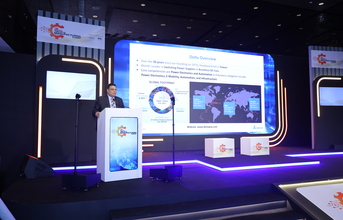
As the industrial world prepares for a significant transformation, Delta Electronics is not merely adapting; it is taking the lead. In an era increasingly characterised by the shift from automation to collaboration, the company has emerged as a pioneer in the transition from Industry 4.0 to Industry 5.0, emphasising human-centric design, sustainability, and resilient innovation.
Dr. Sanjeev Srivastava, Head of the Industrial Automation Business Group at Delta Electronics India, provided an insightful overview of Delta's journey. He highlighted how the company has evolved its vision on both at global scale and within India to embrace this new frontier of industrial transformation.
Founded in 1971 in Taiwan, Delta has grown into a global leader in power electronics, automation, mobility and infrastructure, with a staggering revenue exceeding $30 billion and over 85,000 employees worldwide. "We are proud to hold more than 11,900 patents globally," said Dr Srivastava. "That's a testament to our ongoing investment in innovation—over 8 per cent of our revenue is reinvested into R&D every year."
In India, Delta has made deep inroads—powering over 60 per cent of the nation's telecom towers, leading in EV charging infrastructure, display solutions, and industrial automation. With manufacturing hubs in Gurgaon, Uttarakhand, and a state-of-the-art facility in Krishnagiri, Tamil Nadu, the company is a staunch advocate of the 'Make in India' initiative. Its R&D centre in Bengaluru, housing more than 500 engineers, many of them postgraduates and PhDs, exemplifies the company's knowledge-driven approach.
But the real story lies in how Delta is reimagining automation. "Industry 4.0 was about cloud computing, IoT, and mass automation," Dr Srivastava reflected. "But what was missing was the human touch." The pivot to Industry 5.0, he explained, brings in the missing dimensions: empathy, sustainability, and resilience. It marks a fundamental shift: from machine-centric automation to human-machine collaboration, from technology-led innovation to purpose-driven problem-solving, from mere data collection to contextual data application.
Delta's recent advances reflect this philosophy. "We are now developing collaborative robots or cobots, that work alongside humans," he shared. Unlike traditional SCARA or articulated robots, which required fencing to separate them from human workers for safety, these new generation cobots are designed for intuitive collaboration, equipped with built-in intelligence and safety features. "They are not just machines, they are teammates."
Complementing these are ergonomic workstations and augmented reality-based skill development tools. "One size doesn't fit all," he asserted. "Whether on the factory floor or in the office, comfort enhances productivity." Safety too, once overlooked in many Indian industries, is now front and centre in Delta's design philosophy. "You cannot have human-machine collaboration without placing human safety at the core."
Industry 5.0, according to Dr Srivastava, is not about pitting machines against people. "It's about allowing each to do what they do best." Automation brings speed, precision, and endurance. But when it comes to intuition, decision-making in unstructured environments, or adaptive creativity, humans are irreplaceable. "The real power lies in their partnership. Machines should augment human skills, not replace them."
Delta's roadmap for the future is ambitious. Having launched human-machine collaborative platforms across industries—steel, cement, plastics, automotive, the company is also taking sustainability seriously. "Carbon neutrality and circular economy are not just buzzwords. We embed them into our design and operations," he said. From developing energy recovery systems that cut consumption by up to 40 per cent, to intelligent power conditioning that prioritises renewable sources, Delta is making sustainability tangible.
Circular manufacturing too, is gaining ground. "We encourage our customers to return end-of-life systems," Dr Srivastava said. "We don't just sell new machines; we responsibly recycle the old." And when it comes to infrastructure, Delta walks the talk. "All our 35 offices and two data centres worldwide are certified green buildings," he shared. The result? A saving of over 43 billion kilowatt-hours of electricity and 43,000 tonnes of CO₂ emissions since 2006.
In a poignant case study, Dr Srivastava recounted how Delta digitised a seemingly simple but meaningful process in the paint industry. Traditionally, painters received promotional tokens inside paint buckets. Manual insertion often resulted in errors, with buckets having multiple tokens or none. "We introduced an automated system that ensured every bucket had exactly one token," he said. But the innovation didn't stop there. With integrated barcodes and data tracking, the company was now able to trace sales patterns across geographies, tailor marketing efforts, and enhance customer engagement. "A small change, but a big impact."
The session concluded with Dr Srivastava underscoring the essence of Delta's philosophy. "It's not just about technology replacing humans. It's about technology enhancing human potential, for a better, more sustainable tomorrow."


























